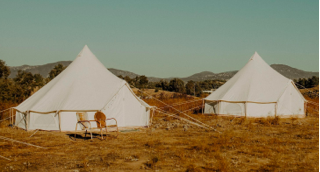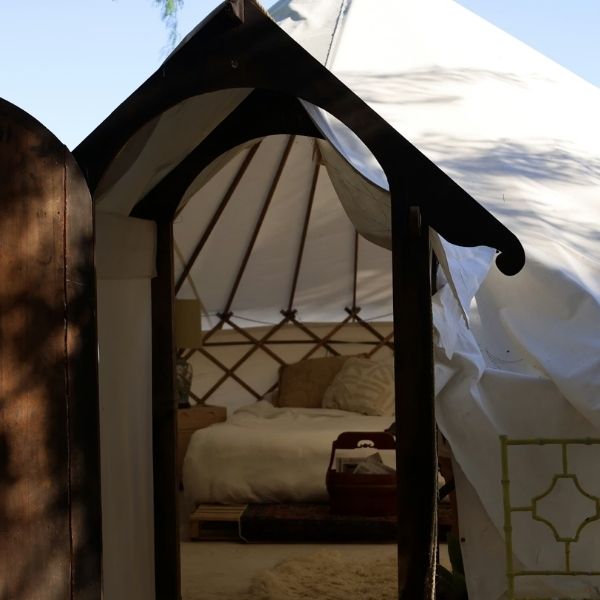LIVRAISON GRATUITE
Free Shipping

Pay No Sales Tax
30-Month Warranty
LIVRAISON GRATUITE
Tentes
À propos
Boutique


La liste LiT
Idées de glamping et de camping + ressources
First Time Camping: 8 Tips for a Smooth and Enjoyable Trip
5 lire la lecture
Are you thinking of planning your first time camping trip and wondering where to start? From choosing the right camping tents to picking a family-friendly campground, there’s much to consider before heading into the great outdoors. But don’t worry — camping doesn’t have to be intimidating.
With the right gear, a little prep work, and the right mindset, your first camping adventure can be comfortable, fun, and even relaxing. Whether you’re camping with kids, friends, or just looking to unplug, these beginner-friendly tips will help make your experience smoother, safer, and more enjoyable.
8 Camping Tips for Beginner Campers
1. Choose a Comfortable and Spacious Tent
Your tent serves as your base camp, so comfort and space are essential. Traditional dome or cabin tents are great for beginners, but a roomier and cozier option is a canvas tent that offers high ceilings and lots of floor space, making it perfect for families! With any tent you choose, always size up. Generally, a 4-person tent actually means 2-3 people, including their cots and gear, so compare tent sizes to find the most suitable one for your crew.
With bell tents, you can even add rugs and furniture like cots and nightstand tables. Sure, they take more time to pitch, but they are durable, breathable, water-resistant, and nice for large families heading out on a first-time camping trip.
2. Book a Car Camping-Friendly Campground

For a first-time camping trip, skip the remote destinations. Instead, locate a campground that is close, accessible by car, and offers basic amenities. Booking a nearby car camping-friendly campground lowers the stakes (if things go really belly up), and you have no choice but to bail and head home. It also helps to find a more family-friendly campground that offers amenities like restrooms and shower facilities, potable running water, picnic tables, fire rings, and, if you’re lucky, refreshing pools and camp stores for those last-minute items you might forget to pack.
We recommend searching for local state and national parks. Some even offer websites where you can view campsite photos and read reviews to help you navigate and select a spot. Another piece of advice? Don’t assume you’ll snag a “First-Come, First-Served” site, or you might be severely disappointed. Always reserve a camp spot in advance, especially during peak seasons.
3. Practice Pitching the Tent at Home
Make sure you set up the tent at home before venturing out! Many expletives have been thrown from folks trying to set up camp at the site, after a late arrival, in the dark, or worse. Instead, do yourself a favor and do a “dry run” in your backyard or living room, then plan to arrive at the campsite during the day with plenty of light left.
In fact, test and double-check all your camp gear. Inflate the mattress or camp pads, charge your headlamps and USB devices, and make sure the stoves ignite properly. This step gives you the chance to familiarize yourself with how everything works, making the actual setup far less stressful.
4. Make a Camping Packing List (Never Wing It)
Spontaneity can be fun – but not for the first time camping! Even when car camping, you need to be prepared. And packing everything you need is half the battle. Forgetting to pack the essentials like flashlights, bug spray, or a comfy sleeping pad can turn a fun camping trip into a frustrating experience, and potentially ruin camping for you and your family entirely.
So plan accordingly and think it through. Create a well-organized packing list, categorized by shelter, bedding, clothing, food, kitchen gear, safety supplies, and personal items. Take a look at this handy, printable family camping checklist and article by Life inTents to get a start on your own packing list and help the trip go smoothly.
Aside from camping essentials, consider other items to make the site feel like home. Bring comfort items like games and entertainment or even accessories to make it more of a glamping weekend. Explore the glamping checklist for more creature comfort inspo!
5. Plan Low-Maintenance Camp Meals Ahead of Time

It helps to set up an efficient camp kitchen, complete with utensils, plates, paper towels, and more. But be warned: cooking at the campsite takes more effort than at home. For first-time camping trips, plan easy-to-prepare meals ahead of time, in the comfort of home, freeze them, and let them thaw in the cooler. Keep in mind, too, that not only should camp meals be easy to prepare, but also to clean up.
And make the meals simple. Think hot dogs and hamburgers, canned soup or chili, and already-boiled pasta. Oatmeal, granola bars, and fruit are also easy breakfasts (remember the coffee!). Besides, this way, you’ll have more time to enjoy with family and camping companions.
6. Keep a Watchful Eye on the Weather
Keep a pulse on the weather forecast for your camping trip. Even if the weather looks clear, plan ahead! Shifts in temperature and unexpected rain can put a real damper on a first-time camping experience. So bring waterproof jackets and quick-drying layers, extra blankets for warmth, and a quality tent rainfly.
Furthermore, remember to pack some fun rainy-day activities. If you find yourself stuck inside a tent, some entertainment will keep the crew from going cabin crazy. Consider indoor and portable family camping games, such as coloring books, playing cards, and more. You’ll thank us later!
7. Remember: Safety First
Learn how to stay safe while camping and prepare for every scenario. First time camping can make some folks nervous and safety is incredibly important for families camping with kids too. So teach kids the basics about encountering wildlife and exploring the landscape – adults should learn too!
Be sure to pack a well-stocked first-aid kit, complete with essentials such as bandages, antiseptic wipes, pain relievers, and even tweezers for removing ticks and splinters. Bring personal medications too.
8. Respect Nature and Campground Rules

Practice good camping etiquette. As a start, learn and follow the Leave No Trace principles to respect nature. But more than that, and especially since you’re at a public campground, learn the campground rules and be kind to fellow campers. Many novice campers unknowingly play music too loud, sometimes even late into the night. And many new campers simply don’t realize how far voices can carry – an easy mistake we all make. But try to be mindful and respect both Mother Nature and your neighbors.
Relax and Embrace the Experience
Your first camping trip doesn’t need to be perfect. In fact, expect it not to; camping is a learning curve, after all. Get into the mindset of relaxing and embracing the experience, along with its imperfections. And if it does go off without a hitch, you’ll be pleasantly surprised.
But… along with your sense of adventure, we always encourage a little planning to help your first time camping trip go as smoothly and enjoyable as possible. That way, you can focus on creating memories, disconnecting, and being present with your family and friends.
So pack up the gear, grab your favorite snacks, and get ready to sleep under the stars. Nature is calling — and now, you’re ready to answer.
Related Resources

LA LISTE ÉCLAIRÉE 4 lire la lecture
5 Reasons Yurt Tents Are the Ultimate Backyard Guest House
Hosting overnight guests? Consider a spacious backyard yurt tent as a spare guest room. Since many fHosting for the holidays or inviting overnight guests? Here are 5 reasons why yurt tents create the ultimate backyard guest room for your visiting family and friends. Affordable reason for selecting a yurt style tent for more permanent backyard glamping.

LA LISTE ÉCLAIRÉE 2 lire la lecture
Ventes de tentes de camping du Black Friday grâce à la Cyber Week
Cherchez-vous à économiser de l’argent sur l’achat d’un cadeau de tente de camping pour quelqu’un de Blogues populaires
1. Qu’est-ce que le Glamping ?
2. Comment démarrer une entreprise de glamping
3. Créez une plate-forme de tente cloche
4. Les meilleures toilettes portables pour le camping
5. Comment installer et plier une tente cloche
6. Les meilleurs poêles de tente à cloche – Façons de chauffer une tente en toile
Produits populaires
S'abonner
Inscrivez-vous pour recevoir les dernières nouvelles sur les ventes, les nouveautés et les conseils
DEVENEZ UN INITIÉ
Nous partagerons périodiquement avec vous des idées, des sorties de tentes cloches, des offres spéciales et des notifications d'événements.



